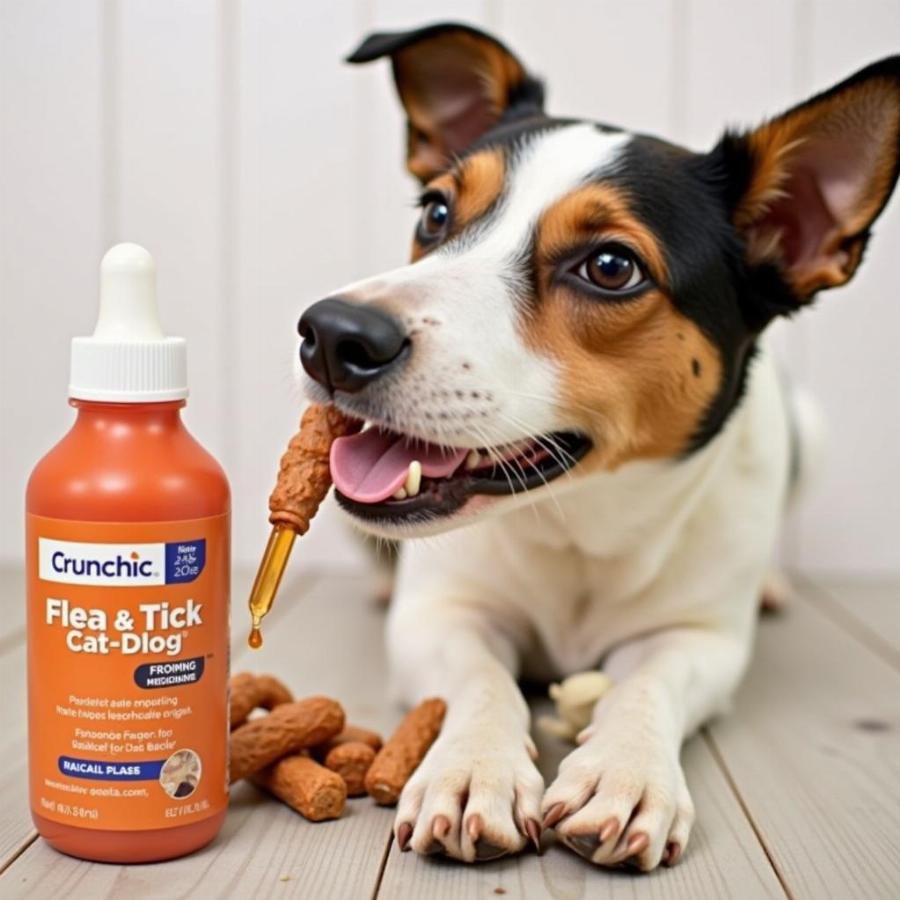Flea vaccines for dogs: Are they a real thing? Many dog owners search for a “flea vaccine for dogs,” hoping for a simple solution to pesky flea infestations. While no true vaccine exists that prevents fleas entirely, understanding the options available is crucial for effective flea control and protecting your furry friend. This article delves into the realities of flea prevention, exploring the various methods, their effectiveness, and dispelling common myths surrounding “flea vaccines.”
Understanding Flea Control in Dogs
The term “flea vaccine for dogs” often leads to confusion. There’s no injection that immunizes dogs against fleas like vaccines do for diseases. Instead, products marketed as “flea vaccines” usually refer to flea control medications. These medications come in various forms, each working differently to eliminate or prevent flea infestations. It’s essential to understand these differences to choose the best protection for your pet.
 Flea and Tick Medication for Dogs and Cats: Oral Solution
Flea and Tick Medication for Dogs and Cats: Oral Solution
Types of Flea Control for Dogs: Decoding the Options
Several flea control methods exist, each with its pros and cons. From topical treatments to oral medications and flea collars, let’s break down the most common options:
-
Topical Treatments: These are applied directly to your dog’s skin, typically on the back of the neck. They work by spreading over the skin and killing fleas on contact.
-
Oral Medications: These are pills or chewable tablets that your dog ingests. They work systemically, killing fleas that bite your dog.
-
Flea Collars: These collars release insecticide over time, killing and repelling fleas.
Debunking the “Flea Vaccine” Myth
The idea of a flea vaccine is appealing, but it’s crucial to understand the science. Fleas aren’t viruses or bacteria; they’re parasites. Traditional vaccines work by training the immune system to recognize and attack specific pathogens. This approach doesn’t work for parasites like fleas. Therefore, there’s no single injection that can provide complete immunity against fleas. dog shots for fleas and ticks are important for preventing tick-borne diseases but don’t directly address fleas.
What to Look for in Effective Flea Control
Choosing the right flea control method depends on your dog’s lifestyle, age, and health. Consider the following factors:
- Effectiveness: How well does the product kill and repel fleas?
- Safety: Is the product safe for your dog and your family?
- Convenience: How easy is the product to administer?
- Cost: How much does the product cost?
How Do Flea and Tick Preventatives Work?
Most flea and tick preventatives work by disrupting the flea’s life cycle, preventing them from reproducing or killing them outright. Some target adult fleas, while others target larvae or eggs. Understanding how these preventatives work can help you choose the most effective option for your dog. Maintaining accurate shot record for dogs can help track all preventative treatments.
Consulting Your Veterinarian: The Best Approach to Flea Control
The most reliable way to determine the best flea control method for your dog is to consult with your veterinarian. They can assess your dog’s individual needs and recommend the safest and most effective products. Your veterinarian can also address any underlying health issues that might contribute to flea infestations.
“Choosing the right flea control is crucial for your dog’s well-being. Don’t rely on myths or misinformation. A quick visit to your vet can save you time, money, and potential health problems for your furry friend.” – Dr. Emily Carter, DVM
Conclusion
While a “flea vaccine for dogs” in the traditional sense doesn’t exist, various effective flea control methods are available. By understanding the different options and consulting with your veterinarian, you can choose the best approach to protect your dog from these pesky parasites and maintain their health and happiness. Remember, effective flea control isn’t just about eliminating existing fleas; it’s about preventing future infestations. If you’re concerned about other health issues, such as can dogs have aids, your veterinarian can provide guidance and testing.
FAQ
- Is there a shot that prevents fleas on dogs? No, there isn’t a vaccine in the traditional sense that prevents fleas.
- What is commonly referred to as a flea vaccine for dogs? This term often refers to flea control medications, not a true vaccine.
- What are the most common types of flea control for dogs? Topical treatments, oral medications, and flea collars are common options.
- How do I choose the best flea control for my dog? Consult your veterinarian for personalized recommendations.
- Why isn’t there a real flea vaccine for dogs? Fleas are parasites, and traditional vaccines target viruses and bacteria.
- Are flea collars effective? They can be effective, but their efficacy varies depending on the brand and active ingredients.
- How often should I treat my dog for fleas? Consult your veterinarian for the appropriate frequency based on your dog’s individual needs and the product you choose.
Do you have other questions about dog health?
Check out these related articles on our website: what is anaplasmosis in dogs: symptoms and how to reduce high fever in dogs
Beaut Dogs is your one-stop resource for all things dog-related. We provide expert advice on everything from breed selection to health care, nutrition, and training. For personalized guidance on flea control and other dog care needs, please Email: [email protected] to get detailed and accurate answers from Beaut Dogs. Visit https://beautdogs.com to explore the wonderful world of canine companionship!